Financial News
Woodward (NASDAQ:WWD) Reports Strong Q3, Stock Jumps 12.6%

Aerospace and defense company Woodward (NASDAQ: WWD) reported Q3 CY2024 results beating Wall Street’s revenue expectations, with sales up 10% year on year to $854.5 million. The company expects the full year’s revenue to be around $3.4 billion, close to analysts’ estimates. Its GAAP profit of $1.36 per share was 8.3% above analysts’ consensus estimates.
Is now the time to buy Woodward? Find out by accessing our full research report, it’s free.
Woodward (WWD) Q3 CY2024 Highlights:
- Revenue: $854.5 million vs analyst estimates of $811.1 million (10% year-on-year growth, 5.3% beat)
- Adjusted EPS: $1.36 vs analyst estimates of $1.26 (8.3% beat)
- Adjusted EBITDA: $146.8 million vs analyst estimates of $141.9 million (17.2% margin, 3.4% beat)
- Management’s revenue guidance for the upcoming financial year 2025 is $3.4 billion at the midpoint, in line with analyst expectations and implying 2.3% growth (vs 14.8% in FY2024)
- EPS (GAAP) guidance for the upcoming financial year 2025 is $6 at the midpoint, beating analyst estimates by 3.2%
- Operating Margin: 11.2%, in line with the same quarter last year
- Market Capitalization: $10.5 billion
"We delivered record sales in fiscal 2024 with Woodward revenue exceeding $3 billion for the first time. Robust end market demand along with contributions from operational excellence fueled significant sales growth and earnings expansion,” said Chip Blankenship, Chairman and Chief Executive Officer.
Company Overview
Initially designing controls for water wheels in the early 1900s, Woodward (NASDAQ: WWD) designs, services, and manufactures energy control products and optimization solutions.
Aerospace
Aerospace companies often possess technical expertise and have made significant capital investments to produce complex products. It is an industry where innovation is important, and lately, emissions and automation are in focus, so companies that boast advances in these areas can take market share. On the other hand, demand for aerospace products can ebb and flow with economic cycles and geopolitical tensions, which can be particularly painful for companies with high fixed costs.
Sales Growth
Reviewing a company’s long-term sales performance reveals insights into its quality. Any business can have short-term success, but a top-tier one grows for years. Unfortunately, Woodward’s 2.8% annualized revenue growth over the last five years was sluggish. This fell short of our benchmarks and is a rough starting point for our analysis.
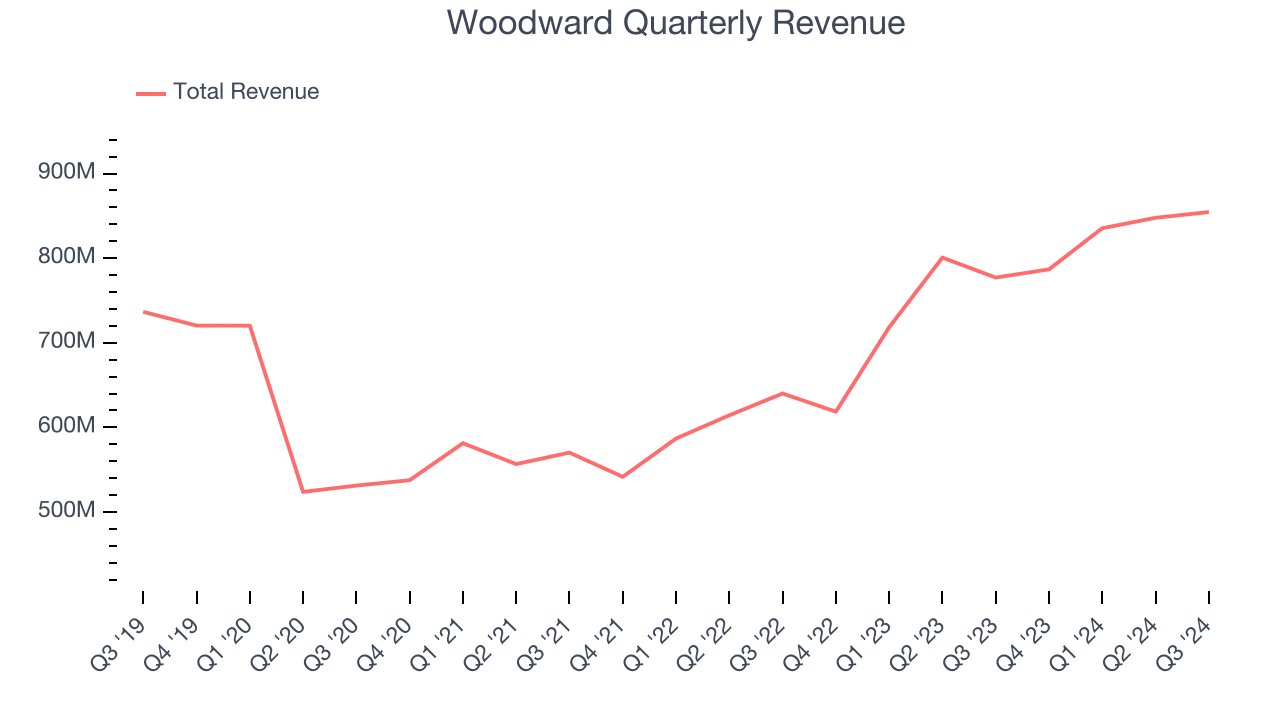
Long-term growth is the most important, but within industrials, a half-decade historical view may miss new industry trends or demand cycles. Woodward’s annualized revenue growth of 18.1% over the last two years is above its five-year trend, suggesting its demand recently accelerated. 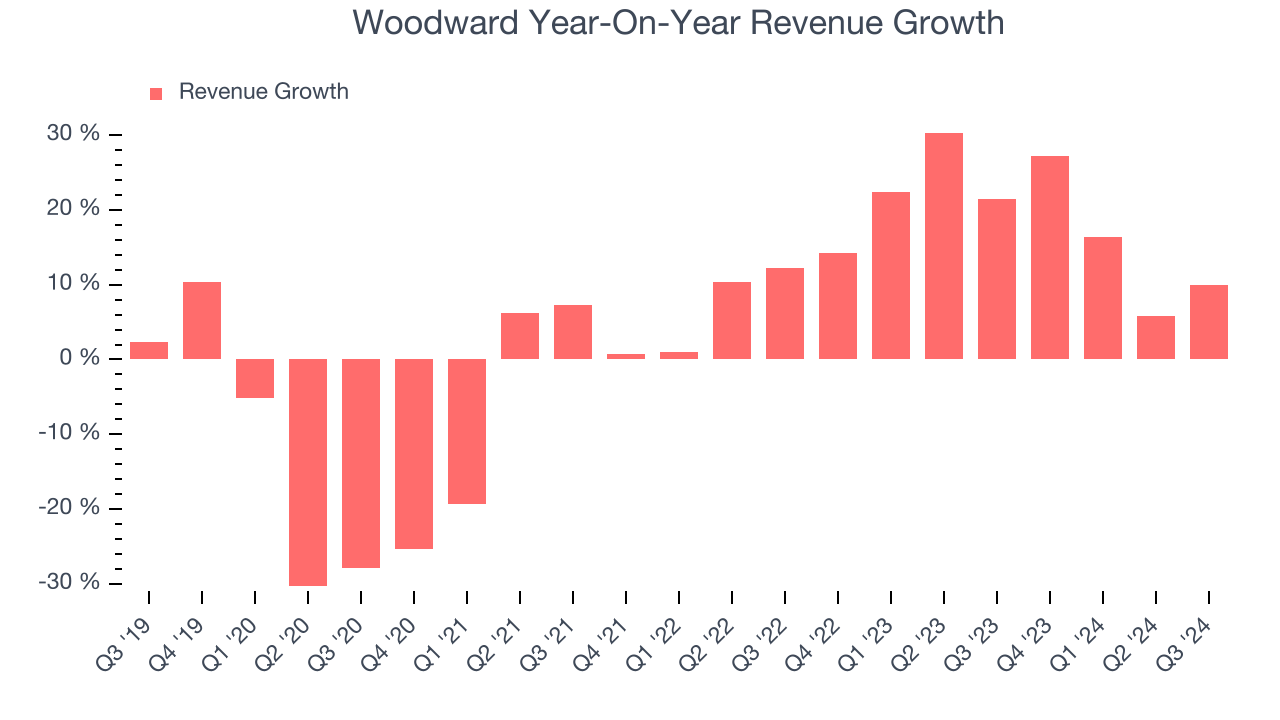
This quarter, Woodward reported year-on-year revenue growth of 10%, and its $854.5 million of revenue exceeded Wall Street’s estimates by 5.3%.
Looking ahead, sell-side analysts expect revenue to grow by 1.9% over the next 12 months, a deceleration versus the last two years. This projection doesn't excite us and implies its products and services will face some demand challenges.
Today’s young investors won’t have read the timeless lessons in Gorilla Game: Picking Winners In High Technology because it was written more than 20 years ago when Microsoft and Apple were first establishing their supremacy. But if we apply the same principles, then enterprise software stocks leveraging their own generative AI capabilities may well be the Gorillas of the future. So, in that spirit, we are excited to present our Special Free Report on a profitable, fast-growing enterprise software stock that is already riding the automation wave and looking to catch the generative AI next.
Operating Margin
Operating margin is an important measure of profitability as it shows the portion of revenue left after accounting for all core expenses–everything from the cost of goods sold to advertising and wages. It’s also useful for comparing profitability across companies with different levels of debt and tax rates because it excludes interest and taxes.
Woodward has managed its cost base well over the last five years. It demonstrated solid profitability for an industrials business, producing an average operating margin of 10.5%.
Analyzing the trend in its profitability, Woodward’s operating margin rose by 2.5 percentage points over the last five years, showing its efficiency has improved.
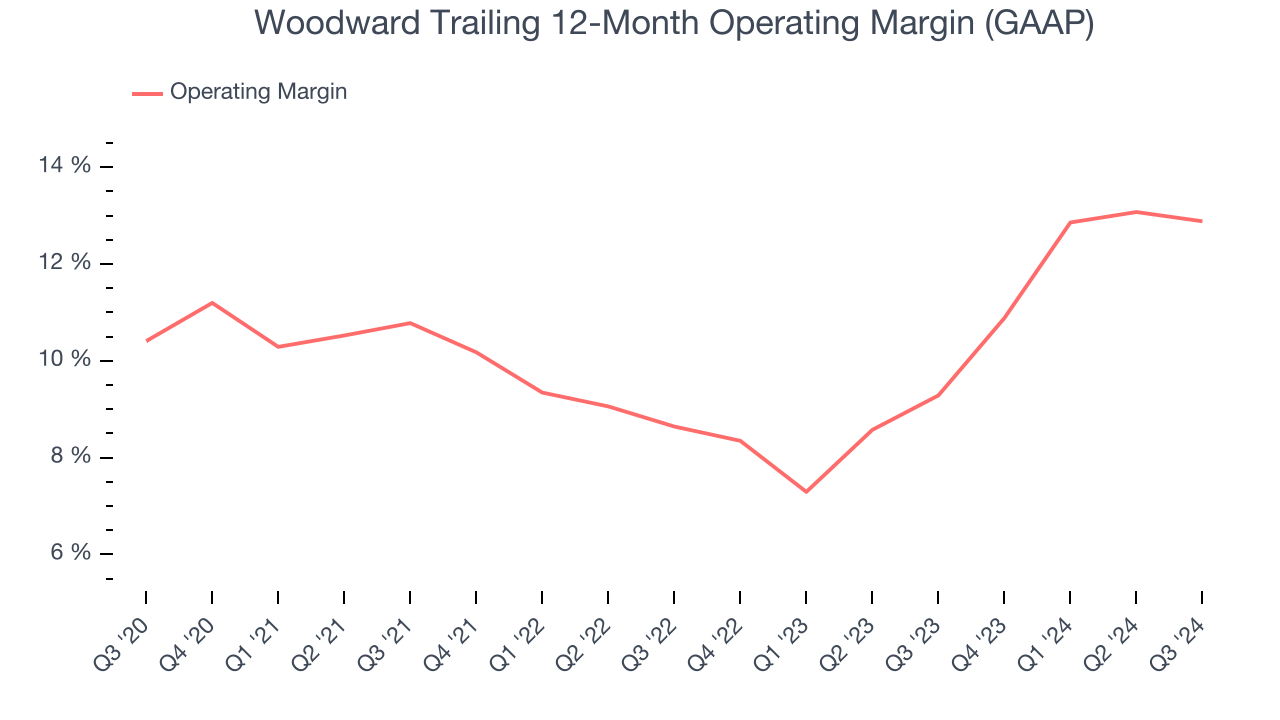
In Q3, Woodward generated an operating profit margin of 11.2%, in line with the same quarter last year. This indicates the company’s overall cost structure has been relatively stable.
Earnings Per Share
Revenue trends explain a company’s historical growth, but the long-term change in earnings per share (EPS) points to the profitability of that growth – for example, a company could inflate its sales through excessive spending on advertising and promotions.
Woodward’s EPS grew at a decent 8.4% compounded annual growth rate over the last five years, higher than its 2.8% annualized revenue growth. This tells us the company became more profitable on a per-share basis as it expanded.
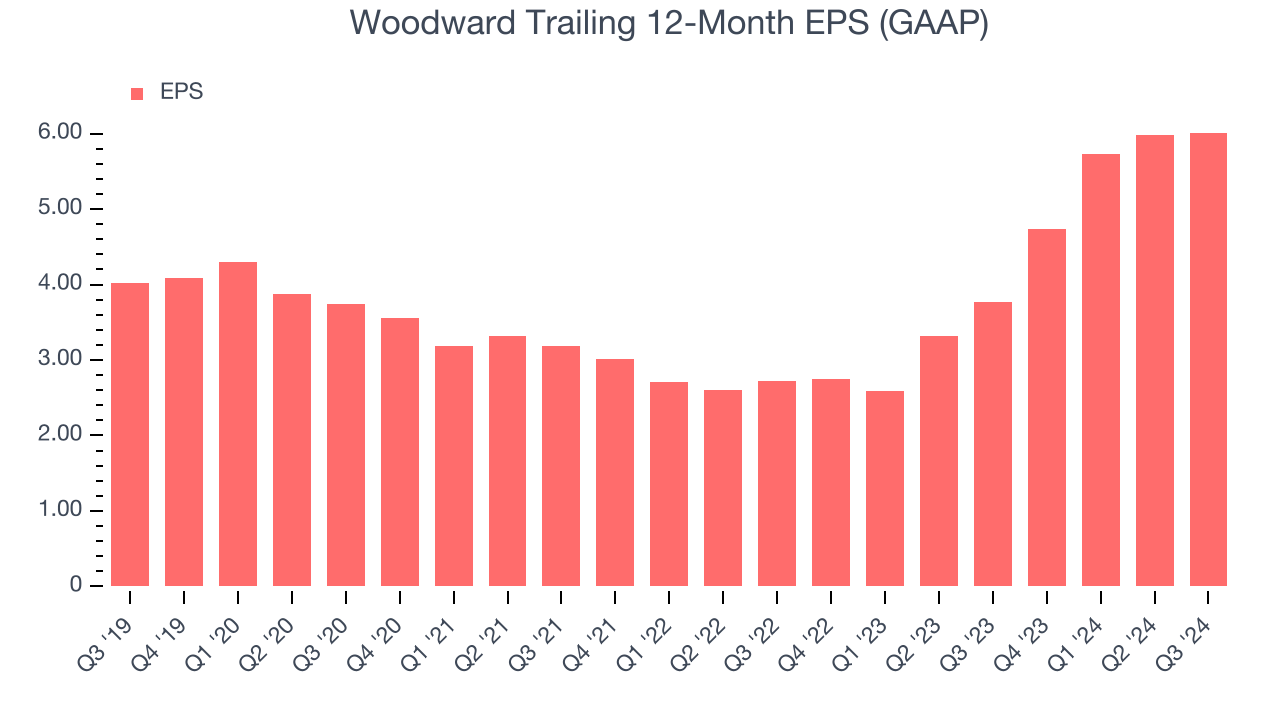
We can take a deeper look into Woodward’s earnings to better understand the drivers of its performance. As we mentioned earlier, Woodward’s operating margin was flat this quarter but expanded by 2.5 percentage points over the last five years. On top of that, its share count shrank by 4.9%. These are positive signs for shareholders because improving profitability and share buybacks turbocharge EPS growth relative to revenue growth. 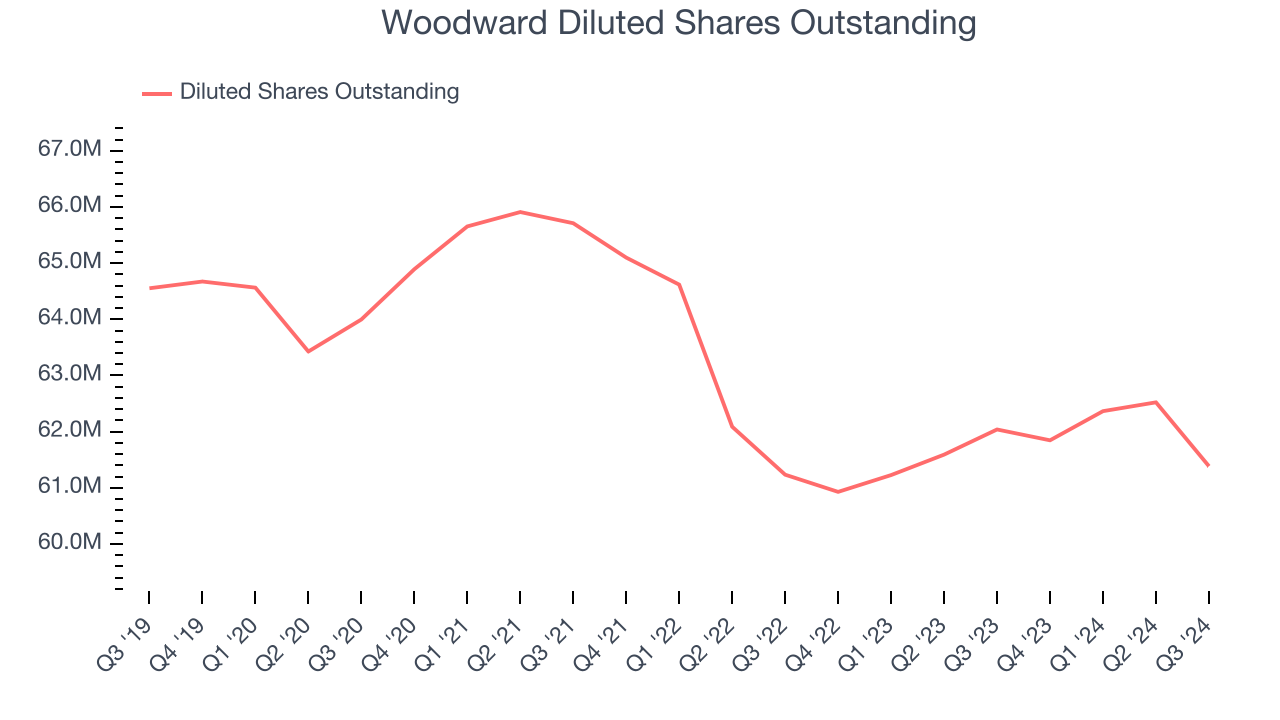
Like with revenue, we analyze EPS over a shorter period to see if we are missing a change in the business.
For Woodward, its two-year annual EPS growth of 48.6% was higher than its five-year trend. This acceleration made it one of the faster-growing industrials companies in recent history.In Q3, Woodward reported EPS at $1.36, up from $1.33 in the same quarter last year. This print beat analysts’ estimates by 8.3%. Over the next 12 months, Wall Street expects Woodward’s full-year EPS of $6.01 to shrink by 2.7%.
Key Takeaways from Woodward’s Q3 Results
We were impressed by how significantly Woodward blew past analysts’ revenue and EPS expectations this quarter. We were also glad its full-year EPS guidance came in much higher than Wall Street’s estimates. Zooming out, we think this was a solid quarter. The stock traded up 12.6% to $202.27 immediately following the results.
Sure, Woodward had a solid quarter, but if we look at the bigger picture, is this stock a buy? The latest quarter does matter, but not nearly as much as longer-term fundamentals and valuation, when deciding if the stock is a buy. We cover that in our actionable full research report which you can read here, it’s free.
More News
View More




Recent Quotes
View MoreQuotes delayed at least 20 minutes.
By accessing this page, you agree to the Privacy Policy and Terms Of Service.



